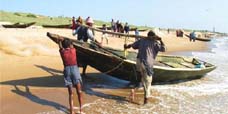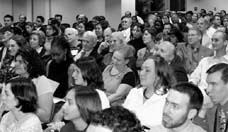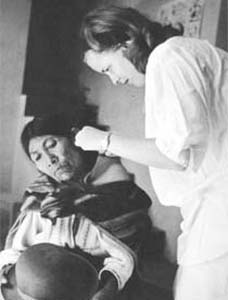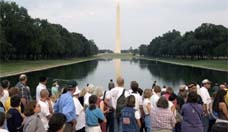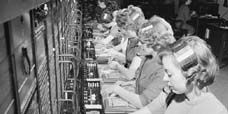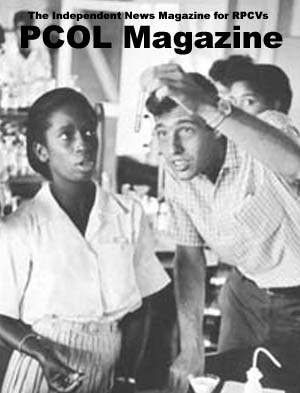
Winning the world's hearts and minds -- a great many of which see the United States negatively -- will be an uphill battle for next head of U.S. public diplomacy
Analysis: Uphill battle for U.S. public diplomacy
By Angela Woodall
UNITED PRESS INTERNATIONAL
Published March 23, 2005
WASHINGTON -- Winning the world's hearts and minds -- a great many of which see the United States negatively -- will be an uphill battle for next head of U.S. public diplomacy.
If President Bush's nominated choice, Karen Hughes, is approved by Congress as undersecretary of state for public diplomacy, the White House insider's task may be greater than any of the challenges she has yet faced.
International attitudes toward the United States are at all-time low, according to Pew global attitudes surveys. The 2002 and 2004 surveys reflected a spike in anti-Americanism in other countries because of U.S. policies, particularly the war in Iraq.
Acknowledging that changing negative perceptions of the United States would be difficult, Hughes said she wants to share America's "good heart," idealism and values with the world.
"This is a struggle for ideas," she said during a news conference to announce her nomination in mid-March.
But the 2004 Pew survey said it was American policies and power fueling resentment toward the United States throughout the world and that the Bush administration brought those resentments to the surface.
Majorities in seven of eight Muslim nations said they believe the United States may someday threaten their countries, including 71 percent in Turkey and 58 percent in Lebanon.
Officials say that Hughes is the right person to change the perception of the United States as an ominous world power ready to attack countries when it wants to push through its policies.
Appointing Hughes will change the face of U.S. public diplomacy because she has the president's ear, said Harold Pachios, a commissioner of the Congressional panel that reviews State Department public diplomacy policies and programs.
Pachios said committing to the survival of Israel while addressing Palestinian concerns would help the U.S. administration improve its image in the Middle East. The administration also has to deal with the resentment caused by the invasion of Iraq among people in the Middle East, who believe America would not have invaded a non-Muslim country.
She also could make public diplomacy part of the policy-making process, instead of a tool to clean up crises, Pachios said. Only someone like Hughes is influential enough to make that happen, he said.
Public diplomacy has been a neglected stepchild in the State Department. A November 2004 report by the department's Bureau of Resource Management called the current state of funding "absurdly and dangerously inadequate," especially in the Middle East. Funding has picked up, however, including a doubling of funds from 2004 to 2006 for the National Endowment for Democracy, which promotes democracy by funding non-profit organizations and civil-society groups. The 2006 budget is $80 million.
Nominating his most trusted aid signaled the elevation of public diplomacy to a new level, said Pachios, who was chairman of the U.S. Advisory Commission on Public Diplomacy from 1999-2003.
Bush's comments underscore Pachios' point. Her appointment, Bush said in a statement, "signifies my commitment to the international diplomacy that is needed in these historic times."
But her relationship with the president could pose problems in the global arena because he is a "polarizing" figure, said Nancy Snow at the University of California's Center on Public Diplomacy.
Snow also said expectations of Hughes are unrealistic.
"Hughes won't do magic," she said.
To be successful, Hughes has to avoid a "superficial poll-driven, if-only-they-would-like-me" approach, said public diplomacy expert Robert Satloff of the Washington Institute for Near East Policy, a think tank specializing in U.S.-Middle East affairs. The mission, not the message counts, he said.
Hughes would be the third person to fill the post of State Department undersecretary for public diplomacy and public affairs in four years if the Senate confirms the nomination. That is not expected until sometime after April 4, when Congress reconvenes.
Charlotte Beers, a Madison Avenue advertising executive, and Margaret Tutwiler, former U.S. ambassador to Morocco, held the position created after the Sept. 11, 2001, attacks.
The job of public diplomacy has changed since 9/11. Hughes is expected to look at traditional public diplomacy tools, such as broadcasting, cultural and education exchanges, and U.S. information centers in foreign countries. Much of the money requested in the president's budget -- $430 million -- goes to the Middle East and South East Asia, including $180 million for Muslim outreach programs.
People in the Middle East are well informed on U.S. foreign policy. The degree of awareness in the Middle East is significant, said Farzad Darui, manager of the Islamic Center in Washington. They know much more than in the past, he said, adding that the news they are getting from sources like the Qatar-based satellite network al-Jazeera is not the same as what is shown in the United States.
Hughes' work will include attempts to counter negative perceptions that U.S. officials say comes from media outlets such as al-Jazeera.
Congress has been pumping hundreds of millions of dollars into broadcasting aimed at Arab-speaking audiences, most notably into Radio Sawa and al-Hurra television. The president's 2006 budget calls for $652 million -- a 10 percent increase from last year.
But they are not taken seriously and seen as propaganda tools because they are funded by the United States, said Delinda Hanley, executive director of the Washington Report on Middle East Affairs.
Hanley said only good policies can change America's image in the Middle East. "Razzle-dazzle communications won't do it."







